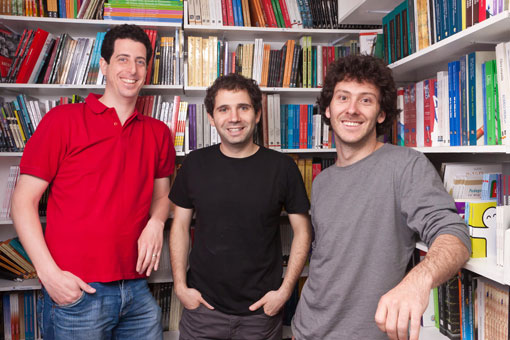When they want to buy or sell an obscure book, most U.S. consumers go to major online retailers like Amazon or eBay, which offer millions of book titles and a graphic interface that makes browsing and buying quick and easy. But for bibliophiles in Latin America, finding books in Spanish—especially ones published in the region—is more complicated.
As a college student on a budget in Santiago, Chile, Eduardo Stekel had trouble finding books for his classes. Noticing that his classmates had similar difficulties, in 2007 the industrial civil engineering and transportation student at the Pontificia Universidad Católica de Chile created Buscalibros (Searches for Books), a small-scale, online marketplace for buying and selling used books.
Stekel initially operated Buscalibros out of his home, generating minor profits through commissions and advertisements. He struggled to earn the trust of local vendors and publishing houses and had to pay for most shipments up front, in cash. Stekel recruited Ricardo Wurgaft, the former strategic development manager at Banchile Inversiones, to shore up the company’s business model as its general manager. “The company grew organically,” says Wurgaft, as the two used profits to buy an office, expand the collection to new books, and begin marketing across Chile.
Seven years later, with a selection of 3 million books total, Buscalibros has unified Latin America’s previously segmented book market. Half of its 80,000 customers come to the site to browse Latin American bestsellers or foreign ones translated into Spanish, while the other half are looking for specific titles they couldn’t find at their local bookstore or on competing websites. Boris Kraizel, the founder of GiveCard (which introduced prepaid gift cards to the Chilean retail market) became the company’s operations manager in 2010. He says he often receives e-mails from customers that say, “I’ve been looking for this book for five years, and I finally found it on your website.”
Buscalibros now has offices and country-specific websites in Chile, Mexico, Spain, the U.S., and Argentina, as well as websites for Colombia and Venezuela. Supplier departments build relationships with local publishing houses and bookstores—the company has 400 such clients across the Americas—and work to expand the catalogue.
Though Buscalibros’ customers often buy products from outside their own country, Kraizel says the company’s goal is to make the buyer and seller feel “like they are down the street from one another.”
Achieving that kind of intimacy presented a unique set of challenges, including diverse currencies, varying levels of infrastructure and often byzantine customs regulations. Clients can pay for their order using one of six currencies and one of nine payment options—from Western Union and PayPal to credit and bank card services. There are no hidden fees. And through partnerships with major shipping companies and small courier services, Buscalibros covers the delivery cost and taxes on all purchases and ensures that products get through customs seamlessly.
Buscalibros’ websites receive a combined 1.3 million hits per month and posted $2 million in profits for 2011—double the revenue earned in 2010. The company uses social media like Facebook and Twitter to increase brand awareness and attract customers from as far away as Japan. The site also recently started a blog, where visitors get information on upcoming books, authors and literature events. And last year the team launched Buscalibre.com, a sister site that sells everything from electronics to household goods.
Buscalibros also boasts 100,000 Spanish-language e-books, the largest catalogue on the web. While the trio—whose tastes range from business nonfiction to Dostoyevsky novels—recognize the medium’s growing popularity, Kraizel feels certain that “books in print will never die out.”






